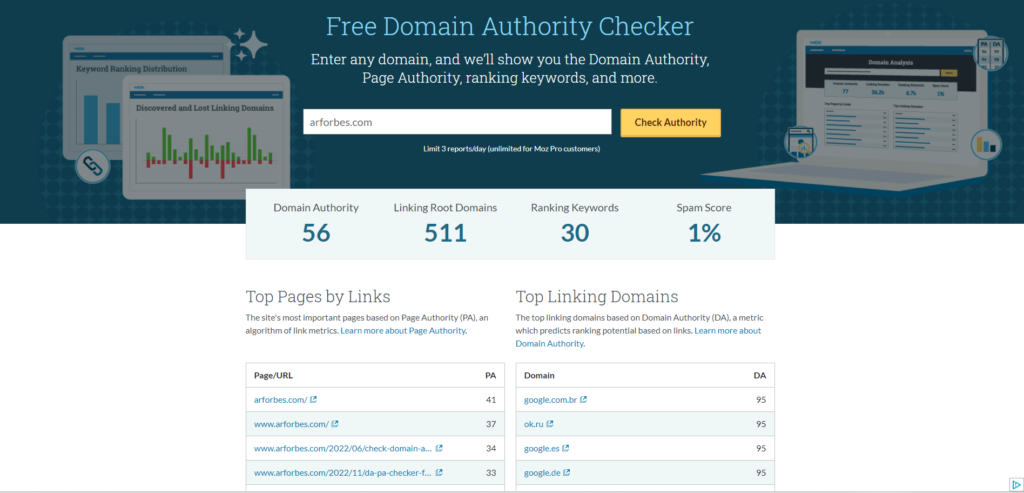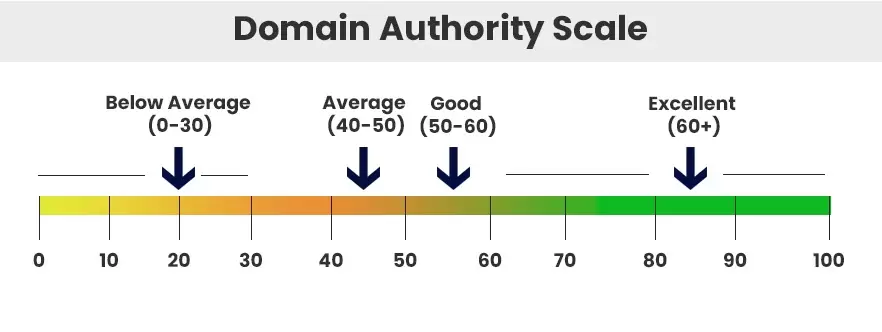Ever think about why some websites do so well in search results? Moving into 2024, domain authority is key for good SEO rankings. It shows how much people trust a site. This trust matters a lot for where a site shows up in search results. Using a site authority checker, site owners and SEO pros can see how well their site stands out.
Many things, like the quality of backlinks and how good the content is, decide a site’s domain authority. It’s all about these and the site’s structure. Learning to check a site’s authority can spot strong points and where to improve. This sets up a strong plan for SEO and boosts search rankings.
What is “Domain Authority”?
Website authority is how well a website does in search results. It looks at things like good content, user experience, and strong backlinks. These boost the website’s trust, helping it rank high.
When it comes to SEO, search engines look at different things to measure a site’s authority. They check if the site is an expert, if it’s trustworthy, and if its content is relevant. Following these principles and using AI well are key in 2024 for the best search rankings.

Let’s look at some important things for website authority:
| Factors | Description | Impact on SEO |
|---|---|---|
| High-Quality Content | Creating relevant and valuable content that meets user intent. | Improves domain trustworthiness and engagement metrics. |
| User Experience | Ensuring a seamless, intuitive user interface and fast loading times. | Encourages longer dwell time and reduces bounce rates. |
| Backlinks | Acquiring backlinks from reputable, authoritative sites. | Boosts the domain’s credibility and rankings on SERP. |
| E-A-T Principles | Adhering to the guidelines for Expertise, Authoritativeness, Trustworthiness. | Strengthens overall domain trustworthiness. |
In 2024, Google will keep valuing these things highly. Webmasters need to keep focusing on them for good search rankings. Knowing and improving these SEO measures can really lift a site’s search performance.
How can calculate our Domain Authority (DR) score
To find a Domain Rating (DR) score, we look at many key things on a website. We check how many and what quality external backlinks it has. We also look at how good and relevant the website’s content is. And we examine its overall structure.
For a precise evaluation of domain strength, advanced SEO tools are used. These tools gather and analyze data automatically. They show the site’s SEO health. A trusted domain score checker keeps track of different measurements. It gives a number that shows how strong the domain is.
Different tools might use different ways to figure out a DR score. But, they generally focus on a few main areas. They look at the types of links coming in, the quality of these link sources, and how well the content matches the website’s purpose.
Using an SEO diagnostic tool can be key for website owners. It helps them keep their sites strong. By constantly checking and working on their site’s strength, they can stay ahead in the online world.
| Platform | Focus Area | Benefits |
|---|---|---|
| Ahrefs | Backlink Analysis | Detailed insights on link profiles and domain comparisons |
| SEMrush | Comprehensive SEO metrics | All-in-one tool for both domain scoring and content analysis |
| Moz | Domain Authority Ranking | Industry-standard for measuring domain strength and competitive benchmarking |
What is a good Domain Authority (authority) score?
To know if your Domain Rating is good, look at where you stand in your industry. The domain rating scale goes from 0 to 100. A high score shows strong domain authority. Get a higher Domain Rating to boost your SEO performance. But set realistic goals.
It’s key to know your industry’s competition. Instead of just aiming for a perfect score, compare with competitors. Look at other sites in the same field to see where you stand.

For example, here’s how different industries might score:
| Industry | Average DR Score |
|---|---|
| Technology | 80-90 |
| Healthcare | 70-80 |
| Real Estate | 60-70 |
| Finance | 75-85 |
Each industry has its own average Domain Rating. It’s important to know where you stand and work to improve. This way, you can do better in the contest with competitors.
How to improve your Domain Authority (i.e., “authority” score)
To up your Domain Rating, you need to focus on many areas of your website. First, make sure you create top-notch content that users love. This will draw in more visitors, helping your site perform better.
Getting links from respected sites is crucial for boosting your domain’s strength. When these sites link to yours, it tells search engines you’re reliable. Then, they might think your website is more important, potentially raising your domain rating.
Don’t forget the technical side of SEO. A well-structured site, one that works well on mobile, and fast page loads are important. They make it easier for users to browse and help search engines index your site better.
It’s also key to update your content regularly. Doing this shows search engines your site is active and fresh. Plus, using the right keywords can make your content more visible in searches, aligning with your SEO goals.
| Strategy | Description | Impact |
|---|---|---|
| High-Quality Content | Develop content that answers search queries effectively. | Increases engagement and organic traffic. |
| Backlink Acquisition | Obtain links from reputable websites within your niche. | Enhances domain strength by signaling trustworthiness. |
| Technical SEO | Optimize site structure, mobile-friendliness, and page speed. | Improves user experience and search engine indexing. |
| Regular Content Updates | Continuously refresh content to keep it relevant. | Maintains domain authority and SEO relevance over time. |
| Keyword Strategy | Utilize keywords strategically to align with search queries. | Boosts search visibility and enhances SEO performance. |
How to use “Domain Authority”
Using website authority well can make your SEO plan stronger. You can use it to check how you’re doing against your rivals and pick the best links to pursue:
1. Benchmarking against your competitors
Website authority is key for checking out your rivals and setting goals for your SEO. By looking at how your site’s authority compares to others, you spot what you need to work on. This shows what SEO areas you need to focus more on and shows how your competition is winning.
When looking at your competition, key in on things like the quality of what you post, the links to your page, and how much folks like your content. Use tools to review the quality of links and to get detailed reports. These insights can help make your site stronger where you might be falling behind.
2. Vetting link prospects
It’s crucial to know about website authority when planning how to get links. You want links from high-quality sites that will boost your site’s authority. This shows why links from respected websites are great—they boost your SEO.
When checking out possible link sites, remember these things:
- Relevancy: The linking domain should fit into your website’s topic.
- Authority: The potential link’s source should be highly trusted to give your site a good SEO bump.
- Context: It should be clear why the link is there and how it helps the reader.
Here’s a chart to help you compare link sources:
| Link Prospect | Relevancy | Authority Score | Contextual Placement |
|---|---|---|---|
| Domain A | High | 85 | Content-relevant blog post |
| Domain B | Medium | 75 | Sidebar link |
| Domain C | Low | 65 | Footer link |
By using these standards, you can make sure you’re focusing on getting good, relevant links. These links can really boost your site’s authority.
Link Building Guides 2024
SEO keeps changing and learning link building is key now. We will learn some tips and rules to make your website stronger. Effective link building helps your website do better online.
How to Increase Website Authority (Domain Rating)
To make your website more trusted, you need a smart plan for links. Aim for links from respected sites in your field. Making content that people want to share, writing for important blogs, and using social media can help others find your content. This will bring more links to your site and make it more well-known.
What is a Backlink? How to Get More Backlinks
Backlinks are links from other websites to yours. They show search engines that your site is valuable. To get more, focus on making content that people find interesting. Work with other websites and be part of online groups related to your topic. This will help grow the number of links to your site. Knowing how backlinks work is important for your website’s success in the long run.
The Beginner’s Guide to Link Building
Just starting with link building? It’s important to understand a few things. Quality links matter more than the number of links. Make sure the words people click on to get to your site relate to what you offer. It’s also good to make friends with key people and be active in online discussions about your topic. And remember, always follow the rules set by Google to get links in the right way.











